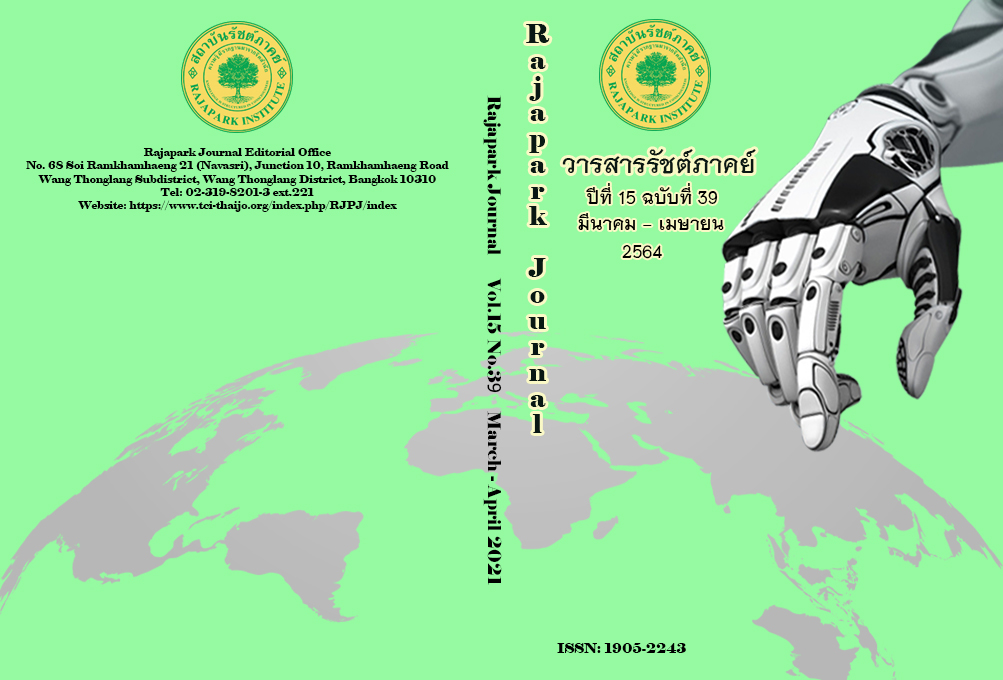Guidelines for the Development of Crime Safety Management for Tourists Staying at Hotels in Pattaya, Chonburi Province
Main Article Content
Abstract
The objectives of this research were to 1) study tourists' attitudes about crime prevention measures; 2) study the problem of crime safety management for hotel travelers; and 3) obtain guidelines for improving safety management from crime to tourists who stay in hotels in Pattaya. The study was a mixed research by quantitative research method the questionnaire was used with 123 Thai tourists and 277 foreigners who stayed at hotels in Pattaya, Chonburi Province. And qualitative research used group chats and in-depth interviews. The results of the research were as follows: (1) Measures to prevent crime for tourists of hotels in Pattaya, Chonburi Province agreed very much, divided into 3 areas: 1) personnel, 2) management, and 3) technology; (2) The problem of crime safety management for tourists staying at hotels in Pattaya City, Chonburi Province. The results of this study showed that there were 6 subjects 1) alien security guards, 2) security guards are not through security training courses, 3) there is an area risk points can hide the villains, 4) some hotels have emerged crime, 5) holding news, and 6) there is a group of criminals; and (3) Guidelines for developing crime safety management for tourists staying at hotels in Pattaya City, Chonburi Province consists of 5 areas: 1) personnel management, 2) management, 3) technology, 4) budget, and 5) law enforcement.
Article Details
Views and opinions appearing in the Journal it is the responsibility of the author of the article, and does not constitute the view and responsibility of the editorial team.
References
Chatchaidej, W. (2011). Aggressive Crimes Prevention by Criminal Triangle Theory. Nakhon Pathom: Royal Police Cadet Academy.
Coltman, M. M. (1989). Tourism Marketing. New York: Van Nostrand Reinhold.
George, R., & Booyens, I. (2014). Township Tourism Demand: Tourists’ Perceptions of Safety and Security. Urban Forum, 25, 449-467.
Goeldner, C. R., Ritchie, J. R., & McIntosh, R. W. (1995). Tourism: Principles, Practices, Philosophies (7th ed.). Chichester: John Wiley & Son.
Hebert, P. R., Slevitch, L., Chung, Y., & Leong, J. (2015). Hotel lighting to enhance guest safety and security. Journal of Social Sciences and Humanities, 1(4), 323-331.
Ministry of Tourism and Sports. (2013). Annual Report 2013. Retrieved October 20, 2017, from http://www.mots.go.th/main.php?Filename=index
Ministry of Tourism and Sports. (2017). Annual Report, Income and Travel to Thailand, 2017. Retrieved November 22, 2017, from http://www.mots.go.th/main.php?Filename=index.
National Statistical Office. (2017). Thailand Yearly Statistics Report 2017. Retrieved November 22, 2017, from http://www.nso.go.th/sites/2014
Nipawong, T. (2011). Factors Affecting Thai Tourists to Pattaya City. Master of Economics. Chiang Mai University.
Nisitsiri, S. (2005). Costumer's satisfaction toward the services of the International Hotel Chiangmai. Master of Business Administration. Chiang Mai University.
Panprong, K. (2001). Security management of guesthouses in the Khao San Road area. Bangkok: Faculty of Social Sciences, Thammasat University.
Phusit, A. (2003). Factors Affecting Success in Prevention of Property Theft in Hotel Establishments: A Case Study of Ban Kram Police Station Klaeng District, Rayong Province. Master of Public Administration. Burapha University.
Sapyen, N., & Rodklongton, T. (2008). Police Handbook, Volume 6, Department of Defense. Crime suppression. Bangkok: Police Printing House.
Peumsomboon, P. (2002). Control of environmental crime: Principles and measures (3rd ed.). Bangkok: Bannakij.
Sutherland, E. H., & Cressey. D. R. (1966). Principles of criminology (7th ed.). Philadelphia: Lippincott.
Tappan, P. W. (1960). Crime justice and correction. New York: McGraw-Hill.
Yamane, T. (1973). Statistics, An Introductory Analysis (3rd ed.). New York: Harper and Row.


